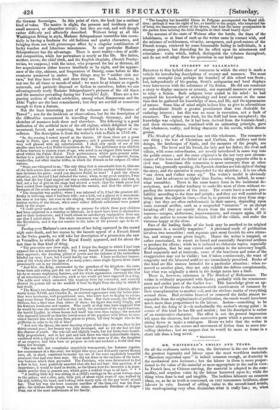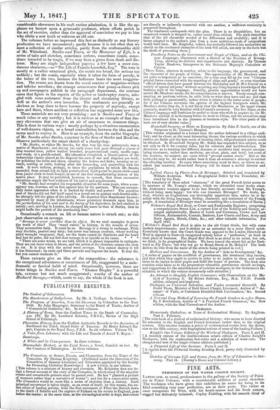MR. WHITEHEAD ' S SMILES AND TEARS.
OF all the craftsmen under the sun, the litterateur is the one who exerts the greatest ingenuity and labour upon the most worthless materials. " Materiem superabat opus" is indeed common enough, as dexterity in the mechanical arts increases ; but the labour in them is more propor- tioned to the value of the material or more appropriate to the end in view. In French lace, or Chinese carving, the material is adapted to the com- modity, and acquires value by the labour bestowed upon it; while the thing when done is real and tangible. The luckless labourer on common ideas, or, as far as truth is concerned, on very uncommon incidents, alone labours in vain. Instead of adding value to the second-hand article, his word-spinning very often diminishes what it really has ; or, when
considerable cleverness in his craft excites admiration, it is like the ap- plause we bestow upon a gymnastic professor, whose efforts perish in the act of exercise, rather than the approval of conviction we pay to him who elicits a new truth or enforces an old one.
The volumes before us impressed this fact as distinctly as any literary production we have encountered ; partly because it is not often that we meet a collection of similar articles, partly from the craftsmanlike skill of Mr. Whitehead. Smiles and Tears, or the Romance of Lffe, is a series of tales and sketches, sometimes serious, sometimes comic, some- times intended to be tragic, if we may form a guess from death and dis- tress. Many are single independent papers; a few have a more con- tinuous character,—as "The Life of Francis Loosefish, Esq." The tone is mostly at a rather unnatural pitch, the comic too broad, the serious too unlikely ; but the comic, especially when it takes the form of parody, is the better of the two, because the ludicrous bears the most exaggera- tion. The events are drawn from the usual sources of magazine-writers and inferior novelists ; the strange occurrences that penny-a-liners pick up and newspapers publish in the paragraph department, the extreme cases that figure in the reports of the police or bankruptcy courts, min- gled with some assistance from the theatre and circulating library, as well as the author's own invention. The sentiments are generally so obvious as long since to have become the property, of anybody, except here and there, where accident or reflection has suggested some new idea. These materials are not very promising : nor is Smiles and Tears of much value or any novelty; but it is curious as an example of that lite- rary cleverness that can give an air of smartness to common things. This is done in various ways : mostly perhaps by a vivacious enumeration of well-known objects, or a broad contradiction between the idea and the terms used to convey it. Here is an example, from the earlier biography of Mr. Snooks alias Storks, a partner in the firm of Storks and Hook'em. Observe particularly the smart sketch of a charity-boy. "Mr. Storks, or rather Mr. Snooks, for that was his true patronymic, was a native of Manchester; and during his early years had gone through a course of blue worsted hose, yellow leather breeches, pepper-and-salt coats, muffin caps, and study, at a parish-school. His education completed, a liberal patron of the industrious classes placed at his disposal the sum of one and sixpence per week, for polishing the boots and shoes, cleaning the knives and forks, running on er- rands, waiting at table, looking after the house-dog, and quarrelling with the cook. It were tedious, perhaps, to trace the gradations by which Mr. Snooks ascended from errand-boy to light porter—from light porter to junior clerk—and from junior clerk to book-keeper, in one of the first manufacturing houses of his native place. It, may be permitted, however, to remark, that these successive elevations supply the best evidence of his talent and acquirements. "Mr. Snooks had occupied his responsible situation for some years, when a con- spiracy was, it seems, set on foot against hint by the partners. Who can success- fatly resist oppression when it is backed by wealth and power? The sensitive seal of Snooks did not feel itself equal to a moral set-to against such fearful odds: he abruptly left the place of his nativity. He departed from Manchester for ever; regretted by many of the inhabitants, whose pecuniary demands upon him, in the perturbation of his soul and in the hurry of his departure, he had omitted to satisfy; and, arriving in London, he changed his name to that of Storks, that he might baffle the pursuit of his unrelenting foes."
Occasionally a remark on life or human nature is struck out; as this just observation on revenge.
"Revenge is never worthier than its object. Do we need examples to prove the truth of this? They 'stand rubric' in history, in the records of crime. They accumulate daily. It must be so. Revenge is a wrong in exchange. Pride may disclaim, passion may deny; but never was human creature, whose working mind wrought vengeance, that, ere the brain ceased its functions and the heart had lost its pulse, did not feel that revenge is as ignoble as its cause. * * • "There are some weeds, we are told, which it is almost impossible to extirpate. They are cut down when in bloom, and the action of the elements causes the stem to rot. It is thus with the moral weed revenge. You cannot destroy it till it has blossomed; its roots and fibres pervade and engross the heart. It may die, but you cannot eradicate it."
These extracts give an idea of the composition : the substance is the exceptional adventures or occurrences of life, exaggerated by a melo- dramatic or farcical habit of mind. Occasionally, however, there are better things in Smiles and Tears. "Eleanor Bingley " is a powerful tale, extreme but not much exaggerated ; worthy of the author of Richard Savage,—which, sooth to say, the whole of the book is not.



























 Previous page
Previous page